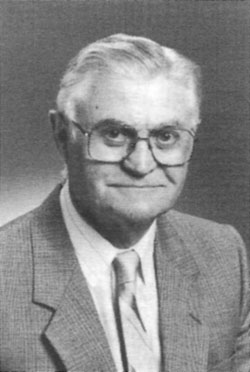Doug Collins Under New Fire for Holocaust Views
Jewish Group Brings Criminal Charges for "Swindler's List" Column
Over the years, few Canadian writers have delighted and aggravated more readers than Doug Collins. Now semi-retired, the feisty, articulate British-born journalist regularly still turns out an often-provocative column for the widely-read North Shore News of North Vancouver, British Columbia.
No stranger to controversy, Collins has recently come under fire from Jewish groups for a March 9 column (reprinted in the May-June 1994 Journal) about Spielberg's much-hyped movie, “Schindler's List.”
Calling it “Swindler's List,” Collins wrote:
Fifty years after the war one tires of hate literature in the form of films. British Columbia school-children are being trooped in to see this effort… What happened to the Jews during the Second World War is not only the longest lasting but also the most effective propaganda exercise ever…
In time of war, propaganda is justified. Fifty years on, it's a bit much. But it comes about because the Jewish influence is the most powerful in Hollywood. One is not supposed to say that, of course. It's the ultimate in political incorrectness…
Opening the new campaign against Collins was a polemic masquerading as a news article in the British Columbia daily paper The Province, Oct. 5. Headlined “Holocaust just a story: Collins,” it began with a doubly erroneous statement: “Right-wing columnist Doug Collins came out of the closet yesterday and denied the Holocaust occurred.” As an irate Collins later pointed out, his views about the Holocaust story have not been a secret, and he is just about the last person in the world to hide his views, in a closet or elsewhere.
Compounding the misrepresentation, the Province article went on to complain that Collins' columns are being reprinted by the Journal of the Institute for Historical Review, which the paper called “a prominent anti-Semitic group in the US.” It added that the IHR “is described by Nazi fighters as a cornerstone of the US neo-Nazi movement.”
The Province made no effort to contact the IHR before printing this rubbish. (For some time now, selected Collins' columns have occasionally been reprinted, with his permission, in this Journal.)
This was not the first time that Jewish groups have expressed displeasure with Collins, an outspoken champion of freedom of speech who has publicly defended Ernst Zündel, and who addressed the 1990 IHR Conference. (Collins' presentation, “Reflections on the Second World War, Free Speech and Revisionism,” was published in the Fall 1991 Journal.)
Not one readily to cave in under pressure, Collins has roared back against the new smear campaign, both in his regular column and during a spiritedly defiant October 21 appearance on the Charles Maclean radio talk show (station CKST). “The press has grossly misrepresented Collins and broadcasters are urging a boycott of the North Shore News,” observes Maclean. “It's a sad day for freedom of speech.”
As part of its vindictive campaign against him, the Canadian Jewish Congress recently brought a criminal charge against Collins, charging that his “Swindler's List” column violates the country's “hate law.” Canada's “Human Rights Act” criminalizes any public expression that “exposes a person or group of persons to hatred or contempt.” If found guilty, Collins could be fined up to $100,000 (Canadian).
Along with Collins, the CJC has also brought a “hate law” charge against John Ball, a British Columbia geologist who rejects the Holocaust extermination story. (Ball spoke about his extensive study of wartime aerial reconnaissance photography at the recent Twelfth IHR Conference).
The CJC complaint “is too ludicrous to take seriously,” says Collins. “The obvious intent is to terrify people into silence,” he adds. “I may wind up losing $100,000 and having to live with the homeless, but I'm enjoying myself.” He slams the complaint as “a direct attack on freedom of speech and freedom of the press – and, as such, well in line with the traditions of the Canadian Jewish Congress.”
Collins, a native of the United Kingdom, served with the British army during the Second World War. After being captured at Dunkirk he was interned, but later escaped from German and Hungarian prisoner of war camps. Recipient of two of Canada's most coveted awards for journalism, his career has included work, both a reporter and commentator, for several major Canadian daily papers, and on television and radio. (For more about Collins, see the Journal of Fall 1991, p. 382, Jan.-Feb. 1993, p. 42, and May-June 1993, p. 22.)
The Collins affair is beginning to receive country-wide attention. Diane Francis, editor of the nationally circulated Financial Post (Dec. 3), castigated Collins' “Swindler's List” column as “dreadful” and “obnoxious,” but at the same time criticized the CJC legal action. Similarly, the leadership of the British Columbia Press Council, a media monitoring group, is “appalled” by the CJC move.
As happened in the Ernst Zündel case, it is likely that the CJC effort against Collins and Ball ultimately will prove counter-productive. For one thing, the “Collins affair” seems to be generating greater public awareness about the Holocaust issue, and public sentiment appears to be largely on Collins' side. For example, every one of the 30 or so persons who called in during Collins' October 21 radio talk show appearance expressed support or sympathy for him. Moreover, a call-in “Hotline” telephone poll conducted by The Province asked readers: “Do you agree with Doug Collins that the Nazi Holocaust is exaggerated?” Of the 295 calls received, 50 percent answered “yes.” (The Province, Oct. 6, 1994.)
– M.W.
Bibliographic information about this document: The Journal of Historical Review, vol. 14, no. 6 (November/December 1994), pp. 43f.
Other contributors to this document: n/a
Editor’s comments: n/a

